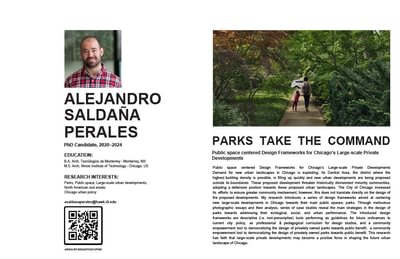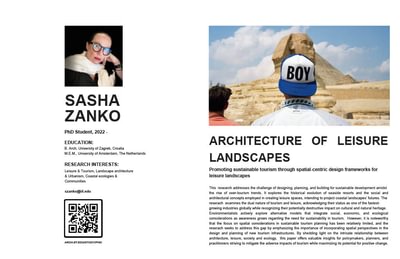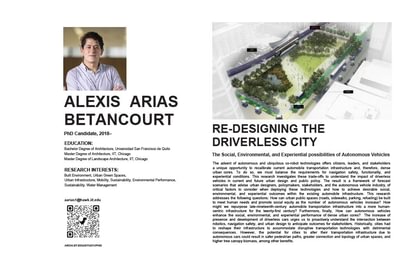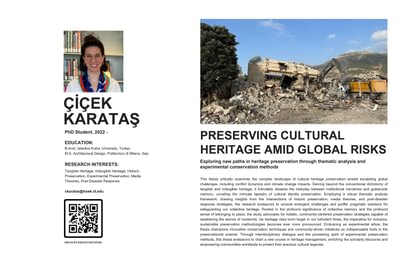
Overview
IIT’s College of Architecture offers the only Doctor of Philosophy (Ph.D.) program in architecture in Chicago, a cosmopolitan metropolis characterized by a dynamic architectural culture, supportive research institutions, and leading firms that drive the profession. The Ph.D. in Architecture program is for those individuals who desire to pursue careers in academia and/or in research-based professional practice. As the most advanced academic degree, the Ph.D. recognizes both the highest level of expertise and the production of significant novel work.
The program, which is offered in two tracks, Technologies of the Built Environment (TBE) and History, Theory, and Criticism (HTC), demands a deep understanding of the related theories in contemporary intellectual terrain, a command of advanced research methodologies, and a commitment to critical inquiry that extends the frontiers of knowledge.
Current areas of study include urban energy modeling, high-rise and long-span buildings, technology applications, energy conscious design, emerging urbanisms, housing, history/theory of modern architecture and urbanism, preservation of modern architecture and landscape, and advanced computer applications.
Curriculum
The program begins with advanced coursework and culminates in a dissertation that is the result of extensive, original, and rigorous research and thought. The Ph.D. program grows out of the school’s collective commitment to progressive research that is grounded in the realities of the workplace and devoted to contesting existing values and ideologies. Doctoral students also have the opportunity to participate in the experiments of design studios and later help guide these efforts in mentoring roles, helping to shape the debate within the college through their involvement in the college’s “advanced studio."
Fall
Spring
Required Courses
| Fall | Spring |
|---|---|
|
|
|
|
|
|
|
|
|
|
|
|
Electives
| Fall | Spring |
|---|---|
|
Elective Courses
|
Elective Courses
|
Ph.D. Research
| Fall | Spring |
|---|---|
|
Doctoral Research
|
Doctoral Research
|

Prometheus Journal and Annual Symposium
Prometheus is a peer-reviewed Ph.D. student journal that showcases research-in-progress presented during our annual symposium hosted by IIT College of Architecture’s Ph.D. program. In addition to presenting new, interdisciplinary research, we seek to remind undergraduate and graduate students and design faculty of the college and beyond of the power of in-depth research to inform and transform contemporary design. In addition to presenting student research, each issue of Prometheus includes a yearly “Ph.D. Program Overview” to showcase the achievements and activities of our community of students and affiliated faculty; this section presents academic programming highlights such as our weekly Architecture Research Forum lecture series and news about the ongoing research and accomplishments of our students and recent graduates.
Each year, Ph.D. students who organize the symposium also serve as guest editors for the journal. Our hope is that the experience gained from these curatorial, organizational, and editorial activities associated with hosting a symposium and editing Prometheus will serve our students well when they enter academia and/or professional practice. We hope our Prometheus will continue to serve as a platform for emerging researchers who, like its symbol and masthead, defy the status quo by taking risks that lead to game-changing innovation in service to humankind, especially in times of crisis like the one we are experiencing now.
In 2020, Prometheus received the Douglas Haskell Award for Student Journals from AIA New York | Center for Architecture. In his letter informing us of the award, Benjamin Prosky, then the Center for Architecture’s executive director, wrote that “the jury was particularly impressed with the fresh and relevant content, beautiful design, and diverse viewpoints in the journal.” Even as digital publications currently play an important role in disseminating research, we continue to believe in the value of offering a digital format along with a beautifully designed printed issue.

Faculty
The College of Architecture Ph.D. Faculty is composed of a select group of accomplished scholars, researchers, and innovative thinkers. Ph.D. faculty value the opportunity to serve as both mentors and colleagues by providing support, insight, and inspiration.

Degree Sequence
The Ph.D. in Architecture combines course work and supervised yet self-driven research, culminating in a Ph.D. dissertation. The first part of the program consists of the student successfully passing a Qualifying Examination at the end of first year with mandatory coursework including ARCH 601 Research Methodologies. By the end of the first year the student is required to assemble, in consultation with the Ph.D. Program Director, a dissertation committee. The second program phase requires the student to successfully pass a Comprehensive Examination (end of second year coursework including ARCH 602 Crafting a Dissertation). The third and final phase of the program culminates in the Dissertation Defense (conducted in the last semester of enrollment prior to graduation) based on the careful examination of a written document by the dissertation committee followed by an oral examination.

Electives
The program includes 14 credits of elective courses both in and outside of the College to provide insight on specific skills and concepts. Electives are tailored to the student’s particular field of study. For instance, a student working on the social dimension of architectural thought might take higher level courses in the social sciences or humanities. Electives include the special projects or directed readings course (ARCH 597). Students may also choose from 400-level or above ARCH, AURB, or LA courses, as well as the following courses from other university departments: CAE 597, MMAE 597, or PHIL 597.

Advising
Each student will be guided by a primary advisor chosen from among the senior college or university faculty whose role is to counsel Ph.D. students, helping them select coursework, as well as shaping, refining and directing the students' choice of research topic. The primary advisor will act as chair of the larger dissertation committee. New graduate students will be required to meet with their primary advisor prior to registering for the following semester.
For more information please visit Student Resources.
The GP Graduate (Program) Advising Hold becomes active before the next semester of registration opens for the following:
- Co-Terminal students in the first semester of graduate co-terminal enrollment
- Traditional masters students at 9 earned or enrolled credits
- Doctoral students at 18 earned or enrolled credits
The GP Hold prevents registration before the following semester until lifted by the advisor. The mandatory advising session is required for the student to clear the advising registration hold.
Students will be notified by their primary advisor how to best schedule their required advising appointment. In general, students may begin scheduling their advising appointments two weeks prior to the first day of registration for the following semester.
At this advising appointment, students will receive a Registration PIN (also referred to as an alternate PIN) and the registration block, which is placed on a student’s record by the Graduate College, will be removed. This will be the only required advising appointment for Graduate students. After their first semester, Graduate student Registration PINs will be visible in the Illinois Tech Portal (under IIT Personal ID numbers).
All graduate students registering for research courses numbered 591, 594, 597, and 691 must receive approval from their primary faculty advisor, in the form of an electronic permit, before registration.

Student Work

Parks Take the Command
Alejandro Saldaña Perales
Parks Take the Command
Alejandro Saldaña Perales

Architecture of Leisure Landscapes
Sasha Zanko
Architecture of Leisure Landscapes
Sasha Zanko

Re-Designing the Driverless City
Alexis Arias Betancourt
Re-Designing the Driverless City
Alexis Arias Betancourt

Preserving Cultural Heritage Amid Global Risks
Ciçek Karataş
Preserving Cultural Heritage Amid Global Risks
Ciçek Karataş





